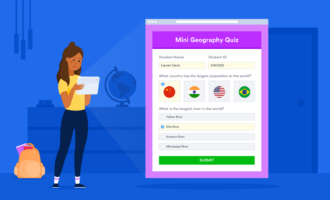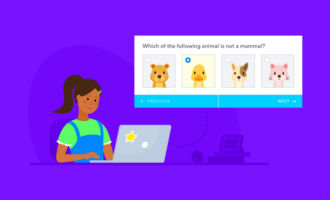If you’ve ever played trivia games, you know how entertaining and engaging they can be. Even if you can’t answer all of the questions, the group camaraderie and good-natured competition make this activity fun.
Playing trivia games isn’t just a great way to have a good time with the gang, though. In addition to providing social interaction, trivia games can improve memory, strengthen problem-solving and critical thinking skills, reduce stress and anxiety, increase knowledge, and promote brain health.
In this article, we’ll briefly
- Discuss the role of trivia questions in entertainment, education, and team building
- Cover the basics of how to create a trivia quiz
- Share a list of trivia questions from several different categories that you can use to build your own quiz
- Show how to create your own trivia quiz with Jotform
Game on!
The benefits of trivia questions
Considering the benefits mentioned above, it’s easy to see how trivia questions can play an important role in many fields, including entertainment, education, and even team building.
As a form of entertainment at social get-togethers, trivia questions are great at bringing people together. Bonding over shared knowledge of arcane or popular topics encourages community, connection, and a healthy competitive spirit. As an added bonus, trivia games can help strengthen current friendships and create new ones.
In the case of education, trivia games help students of all ages improve their reading, writing, math, and critical thinking skills. Trivia games also help increase memory retention, so students retain more of what they learn, which helps them perform better on tests. And of course, trivia makes learning more fun, so students stay engaged.
In the case of team building, trivia games promote camaraderie, communication, and collaboration; improve problem solving skills; and help build morale among teams.
Tips for creating a trivia quiz
Now comes the fun part — creating your own trivia quiz! Here’s how to do it:
1. Choose the format and structure
Is your quiz going to be all text questions or a mix of picture rounds and text questions? How many categories of questions will you have, and how many questions will be in each category?
Is your question mix a combination of easy, intermediate, and challenging questions? You’ll also want to choose a final question and a tie-breaker question.
2. Choose your question categories
The options here are endless, but they include general knowledge, science, movie trivia (which you could further divide by genre, such as romantic comedy, gangster movies, horror, etc.), pop culture, Broadway musicals, food and drink, Civil War trivia, dog breeds, 1970s pop music, sports trivia, U.S. presidents, trailblazing women in history, and so many more.
3. Choose the number of questions per category
Having about 10 questions per category is a safe bet, but this will depend on the type of questions, the makeup of your teams, the length of time you’ve allotted for your trivia quiz, and so on.
4. Research your questions
There’s no shortage of resources for good trivia questions. In fact, a Google search for “trivia questions” returns 329,000,000 results. If you’re still looking for more resources, you can check out Wikipedia, Dictionary.com, your local library, historical association websites, university websites, the Library of Congress online, and so on.
5. Formulate your questions
Now that you’ve done your research, it’s time to create the questions.
Trivia questions shouldn’t be too short and simple or too long and complex; it’s all about finding the right balance. We’ll help you get a better idea of that balance with the example trivia questions in the next section. Again, be sure to develop a range of questions — from easy to intermediate to expert.
6. Create a final question
This is optional, but you may want to consider formulating a final question that allows teams that are behind at the end of the game to catch up. They can do so by agreeing to gamble points on the single final question. This question should be challenging enough to ensure that not every team will be able to answer it correctly.
7. Decide on the incentive
Everybody loves a prize. And the good news is, it can be something simple and inexpensive, like a Starbucks gift card, movie or sporting event tickets, a pass for a free yoga or fitness class, or even a small charitable donation.
30 trivia questions and answers
Let’s take a look at a few trivia questions in five categories to get you started. This is just the tip of the iceberg, though. As we’ve mentioned, you can easily access questions via Google and the other resources noted above to find the perfect trivia questions for your situation.
Easy trivia questions
1. How many bones are in the human body?
Answer: 206
2. Name the five senses.
Answer: Smell, touch, taste, hearing, and sight
3. What food never spoils?
Answer: Honey
4. What is the largest planet in the solar system?
Answer: Jupiter
5. What is the name of the world’s longest river?
Answer: The Nile
6. Which artist painted the Mona Lisa?
Answer: Leonardo da Vinci
General knowledge trivia questions
When you do the research, you’ll find a lot of overlap between “easy” and “general knowledge” trivia questions, so the questions here could easily fit into both categories.
7. Who wrote the novel Pride and Prejudice?
Answer: Jane Austen
8. What is the largest bone in the human body?
Answer: The femur
9. What is the longest above-water mountain range in the world?
Answer: The Andes
10. In which year did the Titanic sink?
Answer: 1912
11. Which is the busiest airport in the U.S. based on the number of passengers?
Answer: Hartsfield-Jackson Atlanta International Airport
12. How many dots are on a pair of dice?
Answer: 42
Entertainment trivia questions
13. On which TV series do the characters Mulder and Scully appear?
Answer: The X-Files
14. What song did Tom Cruise lip sync to in the movie Risky Business?
Answer: “Old Time Rock and Roll” by Bob Seger
15. What day is Star Wars Day?
Answer: May 4
16. Which food does the character Eleven in Stranger Things love to eat?
Answer: Eggo waffles
17. Who was the first rapper to win an Academy Award?
Answer: Eminem (in 2003 for the song “Lose Yourself” from the 8 Mile soundtrack)
18. Who wrote the screenplay for the movie Rocky?
Answer: Sylvester Stallone
Food and drink trivia questions
19. What is the name of a pie made from beaten egg whites that’s also the name of a fabric?
Answer: Chiffon
20. The biggest food consumption days in the U.S. are Christmas, Thanksgiving, and what other day?
Answer: Super Bowl Sunday
21. Which food has more vitamin C than a navel orange?
Answer: Bell peppers
22. Who is the god of wine in Greek mythology?
Answer: Dionysus
23. What plant is tequila made from?
Answer: The blue agave
24. What year was Coca-Cola invented, and who invented it?
Answer: 1886 by Dr. John Pemberton
Science trivia questions
25. How many elements are there in the periodic table?
Answer: 118
26. What is the most abundant element in the universe?
Answer: Hydrogen
27. What is the largest internal organ in the human body?
Answer: The liver
28. What is the nearest planet to the sun?
Answer: Mercury
29. What law states that “for every action, there is an equal and opposite reaction”?
Answer: Newton’s third law of motion
30. What is the name of the tallest grass on earth?
Answer: Bamboo
Use cases for trivia questions
Trivia questions can be useful in many settings, such as in classrooms, on social media, and for pub quizzes, to name just three. Let’s take a look at a few quick examples.
In the classroom
When students are engaged, they learn and retain more. Using trivia in the classroom has proven to be effective in promoting engagement. One way this happens is through what’s known as retrieval practice.
Retrieval practice is a strategy that requires students to deliberately get information out of their heads, rather than packing more information into it. Trivia games allow students to recall what they’ve learned and practice their knowledge, which has proven to be more effective than reading or listening to lectures.
Here are some ways to implement trivia in the classroom:
- Host a trivia day where students compete in a team contest to learn about a specific subject.
- Celebrate holidays with a trivia game based on important milestones in history.
- Include trivia games in regular lessons to make them more fun and engaging.
- Use classroom trivia games as a reward for completing lessons or doing well on tests.
On social media
When businesses use them strategically, trivia questions and quizzes can help increase brand awareness and recognition. If you spend any time on social media, you’ve likely seen this in action.
Simply post trivia quizzes about your brand’s history or products (or even topics unrelated to your business) on your social channels and reward participants who answer correctly with brand merch or gift certificates.
Quizzes are known to boost social media engagement and can generate traffic to your website too. As an added bonus, if you make the trivia quiz engaging enough, some of your social followers will share their results with others, drawing more eyes to your quiz — and ultimately to your business.
Pub quizzes
Ah, this is everybody’s favorite — bar trivia nights or pub quizzes. If you’re an adult over a certain age, there’s a good chance you’ve participated in a fun night out that included a pub quiz.
For pubs, bars, and restaurants open on slow nights, like Mondays and Tuesdays, pub quizzes are a great way to get people in the door. And because trivia games require teams — and even friends cheering on those teams — you can find yourself with a packed house full of hungry and thirsty customers.
Share details about your trivia nights with your current customers as they come in throughout the week and via your website and social channels. Include times, dates, the structure of the evening, rules and regulations, the number of participants required for each team, and prize info.
Prepare questions following the instructions in the section on creating a trivia quiz above, and, at the appointed night and time, let the fun begin.
Tips for setting up a trivia quiz in Jotform
Ready to create your own trivia quiz? Jotform makes it easy, and you can go about it in a few ways.
Trivia quiz form template
- Start by selecting the trivia quiz form template, then customize it by adding your own questions, answer choices, and multimedia elements. You can easily add, edit, or delete questions and answer choices until you’ve built the ideal quiz for your specific situation or use case.
- Customize the design and layout of the form to match your branding or event theme by using the drag-and-drop interface.
- Determine the number of questions, which will vary depending on how long your event is and the level of engagement desired. As a general rule, an engaging trivia quiz will have between 10 and 50 questions.
- In terms of the kinds of questions to ask, review the section on creating a trivia quiz above. Ideally, the target audience and the desired difficulty level will determine your questions. Use a mix of easy, intermediate, and expert-level questions so everyone has a chance to engage.
Free trivia maker
You can also use our free trivia maker tool. Simply choose a ready-made trivia maker template and customize it with our no-code Form Builder. Then use the drag-and-drop functionality to choose fonts and colors, add or change form elements, and add multimedia elements like images and videos.
The intuitive Form Builder allows you to add fill-in-the-blank, open-ended, and multiple-choice questions as well as radio buttons — all with just a few clicks.
Trivia quiz app
Finally, you can use our ready-made trivia quiz app, which you can customize by adding or removing questions, uploading images, adding form widgets, and making other changes. Add your quiz to the app so you and others can share it and download it onto any iOS or Android device.
Photo by Pavel Danilyuk












Send Comment: